Lovage for alcoholism for family and friends
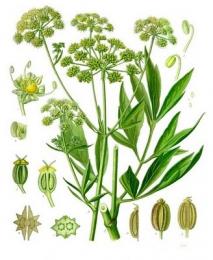
We love - grass, darling, sweetheart or lovage more often found in love spell recipes of all kinds of witches. Let's figure out what beneficial properties it has and whether it can help against alcoholism.
Content:
- Description and growing conditions
- Medicinal properties
- From all diseases
- Contraindications
- Use in home cooking and cosmetology
Description and growing conditions
Lovage is a herb from the Apiaceae family. with a stem height of 100-200 cm, shiny feathery leaves and small yellowish flowers. After lovage blooms in July–August, the fruits ripen in September. This is a perennial, cold-resistant plant that grows in one place for 7 years.
In addition, lovage has a very aesthetic habit and can be useful in any homestead. The soil needs to be loose, otherwise the roots will be clumsy.
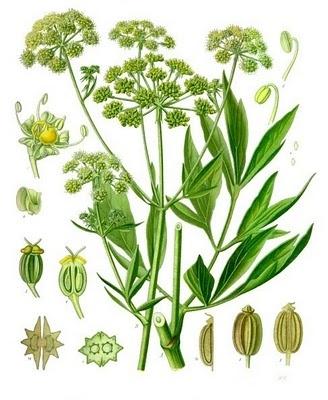
The distinctive feature of the plant is its specific spicy smell, reminiscent of the smell of celery; salty-bitter taste and healing properties. To treat with this herb, you should use infusions and decoctions of the roots. Fresh stems and herbs are used in cooking.
Seeds are sown in early spring and before winter. It is better to pre-soak the seeds in a stimulating solution, since all Umbelliferae take a long time to germinate. Then the seeds are dried to a free-flowing state. Typically, plants are planted at the end of the bed near the aisles or where the trellises for tomatoes or cucumbers end. Since this is a very powerful plant, the seedlings must be thinned out.
Plants of the second year of planting and older are suitable for harvesting medicinal roots. In the first year, greens are consumed. During the season you can get three cuttings.
Lovage is very responsive to watering and organic fertilizers. You can fertilize it with diluted mullein or nettle tinctures. If you do not water it during dry times, the leaves will become small, the shoots will become coarse, and the plant may go into hibernation. Heavy September rains can again awaken the lovage, and it will throw out new tops.
Among the pests, lovage is affected by aphids and carrot flies. Therefore, it is advisable to plant onions, yarrow, and lavender nearby. The appearance of a carrot fly can be determined by the purple tint of the leaves, then they will begin to turn yellow. Of course, rotting affected roots will not be useful for medicinal raw materials, so you need to worry about replanting onions in advance.
Medicinal properties
Lovage for alcoholism is one of the most favorite remedies of our ancestors. An infusion with this herb is mixed into alcohol without the knowledge of the patient. Here is one option for such an infusion: infuse 250 ml of vodka for two weeks with lovage root and bay leaf. When the patient drinks such a drink, he will develop an aversion to alcohol.
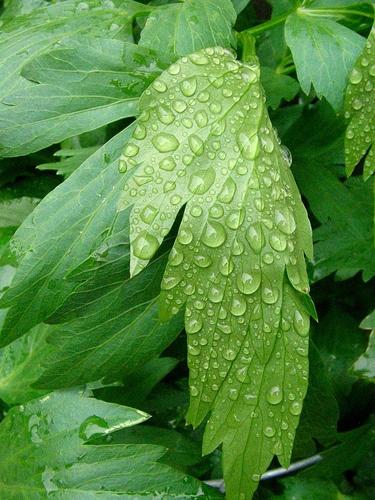
Even the well-known soothsayer Vanga recommended taking lovage for alcoholism: grind 30 g of lovage, 20 g of horsetail, 20 g of juniper berries, 20 g of thyme and 10 g of cyanosis root. One teaspoon of this mixture should contain 200 g of boiling water. Boil the mixture for five minutes, then let sit for one hour. Take two tablespoons after breakfast and lunch for a month.
From all diseases
Lovage for alcoholism - not the only use of this herb. Tinctures based on it have a diuretic, sedative, anthelmintic and choleretic effect. They are also used for dropsy, kidney disease, heart disease, bronchitis, stomach and intestinal diseases and many other diseases.
Contraindications
Since taking lovage causes blood flow to the hip area, it is contraindicated in pregnant women. Individual intolerance is also possible. Lovage should be used with caution by people with urinary tract problems and kidney failure.
Use in home cooking and cosmetology
Freshly dug lovage root quickly turns black when exposed to air, so immediately after cleaning it should be soaked in lemon juice. Its spicy taste goes well with meat and fish dishes. Adding to soups and canned food gives dishes an excellent piquant aroma and a slight taste reminiscent of mushrooms.
Dried lovage root tea
2 teaspoons of chopped lovage roots are poured with cold water (200-250 g), brought to a boil, then filtered immediately. Drink about 2 cups of tea per day.
Baths, ablutions
Mix in equal parts lemon balm, lovage, verbena, yarrow. Pour boiling water over it, and after the water has cooled, wash the body.
For hair loss
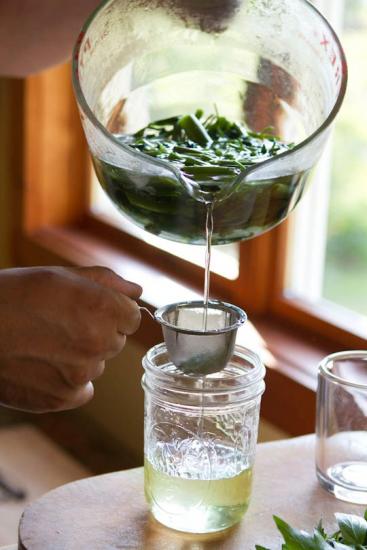
Pour 2 teaspoons of chopped lovage roots into 1 cup of boiling water and leave for 8 hours in a thermos. Then the infusion is cooled and rubbed into the skin. The infusion is not washed off for about two hours, then the head is rinsed with baby soap or black bread. The infusion has no contraindications; the procedure can be repeated every other day.
Root decoction
Used for kidney and heart diseases, as well as to relieve pain during menstruation and the urinary tract.Take a liter of water and 30 g of roots soaked overnight. The mixture is boiled for 5 minutes and filtered. The resulting decoction is divided into 5 doses per day.
So, if you trust Vanga’s advice and you have relatives with alcoholism problems, then lovage may be an option for salvation. Of course, it is much safer to turn to narcologists. But it happens that awareness of the disease never comes, and many try to save their loved ones with folk remedies. Well, this is the way out. But besides this method of use, lovage has a lot of other beneficial properties and recipes. Perhaps they will benefit you too.


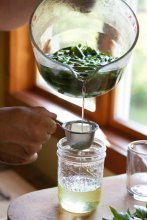
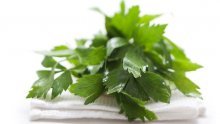
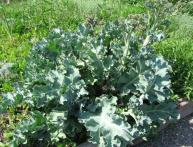
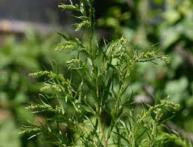
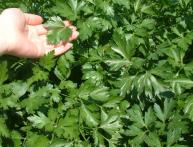
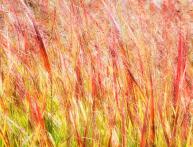
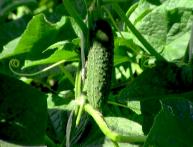
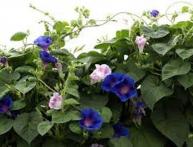
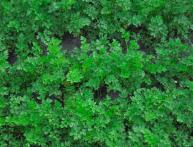
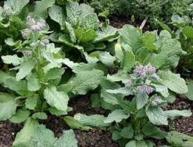
Comments
Yes, I've heard a lot about this plant. But, to be honest, this is the first time I’ve heard that it is a diuretic. This is how to apply it? Root decoction?
This is the first time I have heard of such a plant. I wonder where it grows in the wild? And does anyone grow it at home? Many, probably, if they knew that they could cure alcoholism, they would certainly try to put him in prison.
My friend grows lovage on her property, I tried adding it to hot meat dishes, I liked it as a seasoning. But I had never heard of the healing properties of lovage. I will definitely try his decoction to strengthen my hair.